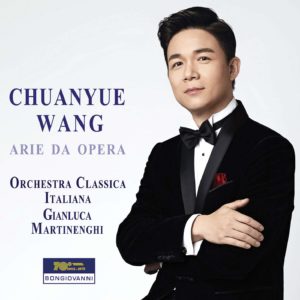
It is with a mix of fearful excitement and some heartfelt admiration for its Herculean task that critics and institutions alike have spilled ink over China’s claims to the international operatic stage. Take the relentless construction of world-class venues (note the recently unveiled proposals for the Shenzhen waterfront!) and the musical training of a whole new generation of singers to measure the extent of its cultural ambitions.
Yet – with the exception of Hui He and, in the late 1990s, Shanghai-born Ying Huang – the introduction of Chinese artists to the West has been slow and recent results from vocal competitions seem to favor talents from South Korea over a host of conservatory graduates from Mainland China.
That is not to say they are absent from the rosters of American opera companies though few have had the chance to build a career outside of routine engagements. I am therefore all the more excited to discuss the release of tenor Chuanyue Wang’s “Arie da Opera,” conducted by Gianluca Martinenghi and recorded for the acclaimed Bongiovanni label.
“Can Belto” pros and cons
Born in China in 1984, Wang has graduated from the Central Conservatory of Music in Beijing. He achieved fourth place in the 4th China International Vocal Competition and won an Adler scholarship at the San Francisco Opera where he debuted as Wagner and Nereo in the 2013 run of Boito’s “Mefistofele.” Yet his career milestones took place in China and Western audiences are unlikely to have heard him perform since a brief appearance at the Teatro Comunale di Bologna in 2019.
Fact is, the number of theatres in Wang’s career so far is limited as is the variety of roles he has reprised on stage. This could also be the reason for the very eclectic tracklist which, for better or worse, reads like a best-of selection from two hundred years of vocal writing: Mozart, Donizetti, Bizet, Verdi (including the “Requiem”), Puccini, and even Franz Lehar!
It would naturally be audacious for any solo recital, let alone a debut album, to pair “Una furtiva lacrima” with, say, “Dein ist mein ganzes Herz” or – another flavorful combination – “Dies Bildnis ist bezaubernd schön” with “Non piangere Liù.” The result must inevitably be one of stylistic indifference and indeed, our tenor’s very muscular yet unchanging tone is a prime example of “can belto” singing, full-throated, physical, with a steely edge, and somewhat unimaginative.
This in itself does not make “Arie da Opera” a questionable album and its moments of sheer visceral excitement have transformed my listening experience into something of a double-edged sword. Take “Addio, fiorito asil” from the third act of “Madama Butterfly:” there is little of the bitter-sweet melancholy that we would typically look for in Pinkerton’s exit aria, as for the most part Chuanyue Wang’s phrasing does not prove innovative nor psychologically insightful.
Yet listen to the tremendously beautiful legato with which he ascends the melodic line up to the high B flat of “Ah! son vil.” It is gloriously spun on a single breath and I am keen to think Wang is following in the footsteps of the late Giuseppe Giacomini. Their vocal dispositions strike me as being very similar and there is no reason to believe the tenor does not have the resources to establish himself in the dramatic repertoire.
Breaking the decibel-meter
There is however some significant caveat to Wang’s demonstrations of vocal promise which proverbially run into a brick wall at most notational intricacies and indications of dynamic variation. For instance, in a showpiece like Verdi’s “Ingemisco” they are met with nearly complete disregard and the score’s “dolcissimo morendo” (“absolvisti”) turns out just another compound of high decibels.
That an occasional melisma is not as fluent as can be must not be held against Wang whose overall evenness of sound (to the extent of not even breaking a sweat at the passaggio and above!) only proves his mastery of the low-larynx technique. It is therefore incomprehensible to me that the emotional effects of a well executed mezza voce should go unused.
Stentorian, with a well-rounded, ringing voice and a natural propensity towards the thrills of broad legato singing, Chuanyue Wang has all the aesthetic components of what made tenors the likes of Del Monaco international superstars. It would indeed be very rewarding to compare “Arie da Opera” to a live performance, not least to assess the actual range of what, on disc, appears to be an unusually large voice.
Interestingly, the latter is at its most glorious in two arias which have consistently established themselves in the poperatic repertoire: “Nessun Dorma” and “Dein ist mein ganzes Herz.” I have found it immensely enjoyable to listen to the riches of Chuanyue Wang’s voice without the pretense of looking for some deeper meaning in the character’s psychology – or, for that matter, having to admit we are only hearing a very raw talent. For Wang has a sumptuous voice and we can only hope he finds the expressive means to make a full-grown artist.


